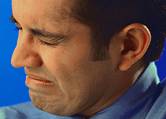 |
 |
 |
||
    |
||||
|
||||

Men's Stroke Risk Rises Dramatically in Mid-40s
And the contributing factors are often those seen in older patients, study finds|
|
HealthDay
Thursday, February 26, 2009
 THURSDAY, Feb. 26 (HealthDay News) -- The odds of having a stroke seem to spike up when men reach their mid-40s.
THURSDAY, Feb. 26 (HealthDay News) -- The odds of having a stroke seem to spike up when men reach their mid-40s.
And the risks associated with stroke even at this earlier age are startlingly similar to the risk factors seen in older patients, a new study found.
"Silent strokes" -- which have no obvious symptoms but can cause residual damage -- are also common in this younger group of men, researchers reported Feb. 26 in the journal Stroke.
"The risk factors are most of the ones we start thinking about in older people -- mostly cholesterol, but also smoking, high blood pressure and diabetes. So that's something we need to start looking at, at a younger age," said Dr. Michael Palm, assistant professor of neuroscience and experimental therapeutics and internal medicine at the Texas A&M Health Science Center College of Medicine.
"If we wait till 50, many of these risk factors are already fairly well established and causing problems," he said.
Since many of these risk factors are modifiable, "there is a need for developing aggressive primary prevention strategies," added Dr. Jukka Putaala, lead author of the new study. "The optimal target group for primary prevention interventions [especially among men] could perhaps be 35 to 44 years."
The phenomenon of silent strokes in younger men also needs to be explored, Putaala said, because such "subclinical" strokes are associated with a high risk of later strokes as well as cognitive decline in older people.
Putaala and colleagues at Helsinki University Central Hospital in Finland evaluated more than 1,000 patients aged 15 to 49 who had been admitted to the hospital between 1994 and 2007 with an ischemic stroke, which is caused by a blocked blood vessel.
As expected, the occurrence of stroke increased dramatically with age. Females were more likely to have a stroke among people under the age of 30, while males predominated starting at about age 44.
Sixty percent of stroke patients had high cholesterol, 44 percent smoked and 39 percent had hypertension, the researchers found.
"It was commonly understood that people who have strokes when they're young have a different set of causes than people when they're older," said Dr. Roger Bonomo, director of stroke care at Lenox Hill Hospital in New York City. "This is identifying a trend toward [risk factors] becoming more like older people in men in their 40s."
But, Bonomo cautioned, the new study was done with a specific population in Finland, and the findings may not pertain so closely to other groups of people.
A second study in the same issue of the journal found that feeling sleepy during the day appears to increase the risk of dying from cardiovascular disease among healthy older people.
Some 10 percent to 30 percent of older adults report having daytime sleepiness, according to the French researchers who did the study.
Among a group of more than 9,000 people aged 65 or over, excessive daytime sleepiness (EDS) was linked with a 33 percent increased risk of dying. Both loud snorers and non-snorers with EDS had an increased risk in mortality. There was no link between excessive daytime sleepiness and dying of cancer.
"This is important, because I think the general physician doesn't always take [EDS] into account," said Dr. John Erwin III, associate professor of internal medicine at Texas A&M Health Science Center College of Medicine and a senior staff cardiologist with Scott & White Hospital in Temple.
"We're taught in medical school that the need for sleep becomes less as people age. The science over the last few years is pointing us away from that, and we see quite a few patients in clinic that complain of this. This probably underscores the need to be more aggressive in referring patients to sleep clinics," he said.
The possibility that sleepiness is an indication of depression also needs to be explored, Erwin said, because depression is associated with a higher risk for heart disease.
HealthDay
Copyright (c) 2009 ScoutNews, LLC. All rights reserved.
Related News:
More News on this Date
Related MedlinePlus Pages:
| Home | Health Topics | Drugs & Supplements | Encyclopedia | Dictionary | News | Directories | Other Resources | |
| Disclaimers | Copyright | Privacy | Accessibility | Quality Guidelines U.S. National Library of Medicine, 8600 Rockville Pike, Bethesda, MD 20894 National Institutes of Health | Department of Health & Human Services |
Date last updated: 27 February 2009 |
